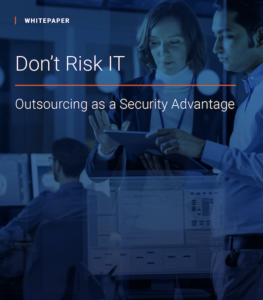Thrive, a managed services giant, has unveiled Thrive Incident Response & Remediation, a new service aimed at helping businesses address and recover from cybersecurity incidents.
BlueSky IT Partners Case Study MC Austin Case Study Don’t Risk IT – Outsourcing as a Security AdvantageIn an era marked by technological advancements and interconnected global markets, organizations face a dual challenge: the imperative to fortify their digital defenses against an ever-evolving array of cybersecurity threats, and the need to maintain operational efficiency in an increasingly complex business landscape. As the frequency and sophistication of cyber attacks continue to escalate, the traditional paradigm of insular, in-house security measures is proving to be inadequate.
DOWNLOAD our white paper today!

The life sciences industry, which includes pharmaceuticals, biotechnology, medical devices, and healthcare, faces a unique set of cybersecurity challenges due to the sensitive nature of the data it handles. This sensitive data is vulnerable to myriad cyber attacks, including data leaks by insiders with access to proprietary company information. Insiders with access to sensitive information can pose a security risk due to malicious intent or unintentional actions, so precautions must be taken.
Nearly 70% of life sciences respondents have seen an increase in data loss incidents caused by insiders over the past year. Download our eBook to learn more.

Confidentiality is of the utmost importance when it comes to managing sensitive and private information. This is especially true for law firms, where client confidentiality is a top priority. With the increasing use of technology in the legal industry, it has become even more challenging to maintain strict levels of confidentiality.
To ensure that confidential information is protected, law firms must implement methods that go beyond the basics. Following are five effective strategies for enhanced confidentiality, including managed IT for law firms.
What Are Common Challenges for Law Firms?
Law firms face a unique set of challenges when it comes to confidentiality. These challenges include:
- Vulnerable Digital Networks: Law firms are at a higher risk of cyber attacks due to the confidential information they possess. A single security breach can lead to severe consequences such as reputational damage and legal liability.
- Human Error: Confidentiality breaches are largely due to human error. Untrained employees may accidentally disclose sensitive information through email or other digital platforms.
- Lack of Encryption: Many businesses do not have strong encryption protocols or managed IT for law firms to protect their data from unauthorized access. This makes it easier for hackers to gain access to confidential information.
How Can Law Firms Improve Confidentiality?
To overcome these challenges and ensure enhanced confidentiality, law firms can implement the following 5 strategies:
1. Enlist an MSP
Replying on managed IT services for law firms means outsourcing the management of a firm’s technology systems to a third-party service provider. These providers have the knowledge and expertise to handle the specific needs of law firms, including sensitive data protection.
By enlisting an MSP (Managed Service Provider), law firms can ensure that their digital networks are protected with advanced security measures, regular updates, and 24/7 monitoring by experts.
2. Make an Incident Response Plan
Having a well-defined incident response plan in place can help law firms handle confidentiality breaches quickly and effectively. This plan should include identifying the breach, containing the damage, and notifying affected parties.
3. Back Up Your System Regularly
Back up the firm’s data regularly to ensure that confidential information is not lost in case of a breach or a technical failure. This backup should be done both onsite and offsite to provide additional protection.
4. Restrict Data Access
Not all employees need access to all confidential information. Implement strict data access controls to limit the number of individuals who have access to sensitive data. This minimizes the risk of human error or unintentional breaches when it comes to managed IT for law firms.
5. Implement Security Software and Training
Invest in advanced security software, such as firewalls and anti-virus programs, to protect against cyber threats. Additionally, provide regular training for employees on best practices for data protection, including how to identify potential phishing emails or other scams. This will ensure the natural element of human error is minimized for the safety of your business.
Thrive: Proactive Managed IT for Law Firms
At Thrive, we understand the importance of confidentiality for law firms. That’s why we offer proactive managed IT for law firms—our services are tailored to meet the specific needs of legal professionals. With our advanced security measures and 24/7 monitoring, you can have peace of mind knowing that your confidential information is in safe hands.
Don’t let vulnerabilities in your digital networks put your firm at risk. Contact Thrive today to learn more.
Partnering with Thrive – Packet Fusion Testimonial The Partner That Knows: Healthcare Industry eBookKeeping patients safe and healthy should be the number one priority for all healthcare institutions. Worrying about patients’ private data falling into the wrong hands should not. As the healthcare industry leans on technology more and more to power innovative breakthroughs, enable seamless communication and collaboration between providers, and create a single source of truth for patient data, it is vital that its IT stacks are robust and able to combat cyber attacks.
95% of all identity theft stems from stolen hospital records. Download our eBook to learn more.

You’ve probably heard it before—make sure your business has a business continuity and disaster recovery (BCDR) plan. But what does that plan need to include, and why is it important to have one?
Having a reliable BCDR plan can ensure that your business stays afloat in the case of an emergency. There are some key components that your backups and disaster recovery plan needs to include for your business to excel.
How Your Business Benefits From Having a BCDR Plan
About 40% of small and medium businesses fail to reopen after a natural disaster. That’s almost half of all businesses that aren’t able to get back on their feet!
Creating a backup and disaster recovery plan is much like constructing a lifeboat for your business. Just as a lifeboat is designed to keep passengers safe and afloat in the event of a shipwreck, a BCDR plan safeguards your business against unforeseen disasters and disruptions.
Having a thought-out plan can:
- Ensure Minimal Downtime: Your business operations can quickly resume after a disaster, minimizing downtime and mitigating the loss of revenue.
- Preserve Your Business’s Reputation: By swiftly recovering from a disaster, your business can demonstrate resilience and reliability, maintaining the trust of everyone involved in the company.
- Reduce Stress During a Crisis: With a well-laid plan, your team will know exactly what to do when a disaster strikes, reducing chaos and confusion.
- Protect Essential Data: You can include data backup strategies that help protect critical business data, preventing permanent loss and facilitating quick recovery.
With a well-constructed lifeboat—or a meticulous BCDR plan—your business will know exactly what to do to make sure you’re part of the 60% of businesses that stay open in the wake of a disaster.
Data Assessment
Identifying any crucial data that must be protected in the event of an emergency is one of the first steps in creating backups and disaster recovery plans. You might include customer information, financial records, and any sensitive information. By understanding what data your business needs to protect, you’ll be able to prioritize resources during a disaster.
Backup Strategies
Check that your business has backup frequency and retention policies. These can specify how long backups are kept, balancing storage costs, and historical data needs. Opt for daily backups to retain the most information, but weekly and monthly backups are an option, too.
Defining recovery objectives, including Recovery Point Objective (RPO) and Recovery Time Objective (RTO), can be a critical part of a backup and disaster recovery plan. RPO is the maximum acceptable amount of data loss measured in time, while RTO is the duration for which a business process must be restored after a disaster.
Off-Site Storage and Redundancy
Storing backups in multiple physical locations mitigates the risk of a single point of failure. Also, redundancy can ensure your business has access to data even if one backup system fails—the more backups you can have, the safer your data will be.
Disaster Recovery Testing
Testing is an integral part of BCDR plans. Types of testing include full-scale tests, which simulate a real disaster event, partial tests, which focus on specific aspects, and tabletop tests, where the plan is discussed in a simulated group setting.
Communication and Notification
Don’t forget to establish clear communication channels so that everyone involved is aware of the current situation during a disaster. How will you notify stakeholders, employees, and customers about any subsequent actions? Transparency is the key to maintaining trust and confidence during crises.
Team Roles and Responsibilities
Clearly articulating individual roles and responsibilities can make certain that every team member knows what to do during a crisis—you could even put together a backup and disaster recovery team to manage an emergency event.
Documentation and Policies
Establishing well-documented policies and procedures is vital for the execution of your BCDR plan. This documentation serves as a comprehensive guide for your team during a crisis, outlining all necessary steps and actions. Without clear instructions documented for employees to follow, the structure can quickly fall away with the chaos and stress of a disaster.
Security Measures
24% of data breaches in 2023 involved ransomware, almost doubling the amount in 2022. Considering the surge in data breaches, it’s crucial to implement security measures to protect you from unauthorized access and safeguard your business data.
Implementing encryption is one measure to store data in a secure format, protecting any information even if it falls into the wrong hands.
Having access controls to limit the number of people who can access your backups also reduces the risk of accidental or intentional data loss.
Compliance and Regulation
Do you know the applicable regulations your business is required to adhere to? These regulations often depend on the nature of your business and the type of data you handle.
Here are a few key ones that many SMBs need to adhere to:
- Health Insurance Portability and Accountability Act (HIPAA): This regulation protects patients’ medical records and other personal health information provided to health plans, doctors, hospitals, and other healthcare providers.
- Sarbanes-Oxley Act (SOX): Businesses in the financial sector need to adhere to SOX, which sets rules for corporate responsibility and provides measures to prevent accounting fraud.
- Federal Information Security Management Act (FISMA): This regulation aims to protect government information, operations, and assets against natural or man-made threats.
Compliance with these regulations can significantly mitigate legal risks; be sure to keep them in mind for an effective disaster recovery plan.
Partner With Thrive For a Proactive Recovery Plan
You may already have backups and disaster recovery plans in place that need adjustments, or you may be taking the first steps to create a plan. Either way, Thrive offers consultation, an offsite data center, and proactive testing to guarantee your business stays open in the event of an emergency.
Contact one of our certified technicians today to get started.
The Partner That Knows: State & Local Government Industry eBookManaging and securing data across a large, interconnected system can be daunting, especially at the state and local levels. Ensuring that you have a secure, up-to-date IT infrastructure is not always easy to accomplish, leaving you and your citizens vulnerable to attacks. Cybercriminals are angling to break through firewalls and clone data where they can, resulting in city or state-wide utility outages, compromised private citizen data, and much more. Breaches like these also disrupt daily operations to a state or local government, which can cause long-term damage.
44% of government agencies have said they experience cyber attacks daily, with the pace of breaches accelerating, according to researchers. Download our eBook to learn more.

